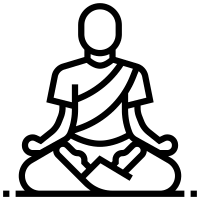Health
Caring for Our Mental Health During COVID-19
Increasing awareness of the impact on our minds and communities.
Posted March 18, 2020

The Coronavirus, aka COVID-19: The name makes one think about physical health and safety. It may bring up feelings of fear and images of disease and illness.
Currently, online and televised news is solely focused on this topic. It is impossible to use your phone or turn on the news without hearing about it.
Social media is swarming with people who are expressing their fears and anxiety. In some cases, people are shaming others for their personal choices about how to manage this pandemic within their family, rather than having kinder conversations. Human survival instincts are kicking in and people are in self-preservation mode.
So, what is missing? A focus on how all of this is impacting the mental health of everyone involved — which is everyone! There are people who have diagnosed obsessive-compulsive disorder focused on germs, hypochondriacs, hoarders, health anxiety disorders and others who may be suffering psychologically from this contagious panic in ways that the average person may not. These individuals need to be reaching out for clinical support from a therapist and psychiatrist.
However, I am still concerned about individuals without pre-existing mental health issues related to germs and health. In the past week, there has been a significant increase in observed and stated disease prevention actions. I recently went onto Facebook for 10 minutes and felt my own blood pressure rise. What a perfect storm: isolated individuals with access to the news and social media in the midst of a pandemic.
Additionally, there seems to be a trend towards shaming others who may disagree with the way others are handling COVID-19. The term “social distancing” has become a battle cry towards pushing others away in a way that makes you feel safe. As social activities, self-care practices, school, routines, and daily schedules are canceled and life’s rhythm is changing rapidly, people are grasping at something to feel a sense of normalcy. Hyperfocus on researching and reading about the COVID-19 is giving some people a false sense of control and even entitlement that they know more than others and are therefore going to be safe.
If you sense judgment in my tone, you are correct. I am alarmed that the way that we as individuals and families are handling COVID-19 is solely focused on physical health and completely lacking awareness of the impact on our mental health and on our communities as a whole.
Statistically, most of us will be alright physically. However, the lasting impact will be on our mental health and relationships. Ironically, when we are experiencing stress and anxiety as well as sleep disturbances, our immune systems can weaken. This is a crucial reason why focusing on our state of mind at this time is so important.
Social support for coping and healing from most conditions and situations is evidence-based. After 9/11, the Boston Marathon bombing, school shootings, hurricanes, and other national disasters, there was a uniting of support for fellow Americans and a sense of unity that healed. While we are in the midst of the unknown, I am observing such a contrast in the way that COVID-19 is being handled interpersonally and it is alarming. There are people who are in recovery from mental health, addiction, and physical issues who are losing most of their in-person support. But they cannot afford to lose that. There need to be creative ways to keep those groups and individuals connected.
People need love and support during this time. They are scared of both the virus and about the responses they may get when they reach out for social reasons. We are so connected to the news and social media, but not to calling, video chatting or texting people to see how they are doing. Maybe they are not your closest family or friends, but they could still use the outreach. People are isolated in their homes, in nursing homes, in their minds. Children are out of school and are becoming more and more isolated from their friends.
What can we do to be more mindful of the impact that our self-preservation is having on those around us? How can you think about others while still focusing on your own physical and mental health? How can we remember and consider that there are small businesses and people’s entire livelihood that are in jeopardy at this time? How can we focus both on our family and on our community?
Here are some suggestions of ways that we can focus on our mental health and communities:
- Reach out and check on at least one person each day who is a loved one, friend or acquaintance
- Create a sense of normalcy and routine in your day
- Take a moment each day to focus on the big picture
- Accept that some days you may not be “okay” and roll with your emotional wave
- Allow yourself and your loved ones to have their own emotional process
- Set boundaries and take space within your own home
- Move a muscle, change a thought
- Limit your exposure to news and the topic of COVID-19 to 30 minutes daily in order to obtain necessary information
- Avoid social media with toxic interactions and information
- Get outside, even in your yard, and enjoy time with loved ones
- Organize your home and declutter
- Practice self-care daily (meditation, exercise, sleep hygiene, eating healthy, etc.)
- Find online self-care and spirituality support (yoga classes, Insight Timer meditation app, group meditation, remote religious services, etc.)
- Practice spirituality from home
- Talk with your therapist on a remote phone session
- Get a referral for a therapist if you feel that you are needing emotional support at this time
- Stay connected to your support system
- Have quiet time in your home daily in order to give each other emotional and physical space
- Engage in a hobby (reading, crafts, something sports-related, etc.)
- Ask how you can be of support to others in ways that feel comfortable to you
- Think about a way to support community members through service of any form
- Support local businesses — shop online, get takeout food, etc.
- Be mindful of the way that you set social limits with friends
- Reach out for support
- Watch stupid TV... binge-watch a show!
- Create some form of structure for your children who are home from school
- Be aware of what you put onto social media, ask yourself if this is a necessary and helpful post?
- Do not send unproductive posts, emails, or texts of panic and alarm to others
- Don’t forget to laugh — humor can be the best medicine
This is uncharted territory for our country and for the world, and we do not know how long we will remain somewhat or totally physically separated. We need to increase awareness about the importance of being kind to ourselves and of focusing on the psychological aspects of COVID-19 that are impacting us in lasting ways.
Excellent Resource for Mental Health Coping with COVID-19: http://complicatedgrief.columbia.edu/wp-content/uploads/2020/03/COVID-1…




